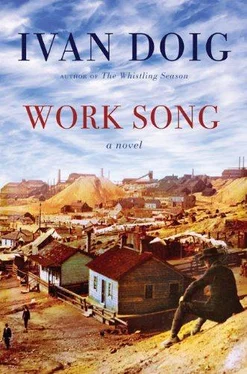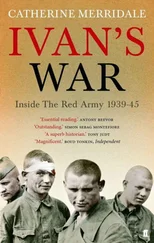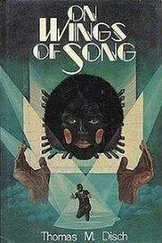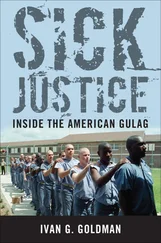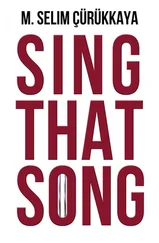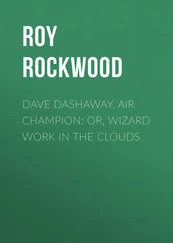
“MORRIE? MORRIE, anyone home between your ears? I asked: How was your day at the library?”
“Sorry, Grace. My thoughts were elsewhere.”
“Miles away, I’d say. White meat or dark?” She was majestically carving off slice after slice of turkey, a surprise feast to the other three of us at the supper table. “I hope it’s not as hard on the nerves as standing over a corpse every night. Wakes would give me the willies.”
“Oddly enough, the library is somewhat more solemn, in a way. May I ask what the occasion is, with this festive bird?”
“The price is down, always to be celebrated.” Dishing out judicious servings of turkey, she returned to that other topic: “Just what is it you do all day there in Sandison’s stronghold, besides keep the books company?”
An apt question, not easily answered. Day by day, besides my juggling act with the meetings schedule, it had been gruffly suggested to me that I organize the disorganized subscription list of magazines and newspapers, find someone to fix the drinking fountain, deal with Miss Runyon’s complaints about squeaky wheels on book carts passing through her sanctum, respond to a stack of letters from people with the kinds of questions only a library can answer-in short, I was tasked with anything Sandison did not want to do, which was very nearly everything.
“This, that, and the other,” I replied to Grace honestly enough. “If the library can be thought of as the kitchen of knowledge, I seem to be the short-order cook.”
Griff and Hoop were saying nothing. She gave them an exasperated look and sat down at her place. Almost immediately, Griff gasped and straightened up sharply. I had the impression Grace’s foot may have given his shin a tap. More than a tap. “I was about to say,” he rushed the words, “you getting along hunky-dory with Sandison?”
“We are on”-first-name basis did not quite cover the situation-“what might be called familiar terms. I call him Sandy.”
“Heard him called a lot, but never that.”
This seemed to bring a sense of relief around the table. Hoop came to life. “Might have plenty of library customers pretty soon, Morrie. Mornings anyway. There’s strike talk. We was at the union meeting last night-”
“I could tell,” Grace inserted. “I heard you come in.” As I unavoidably had, too.
Griff stiffened again, apparently of his own accord this time. “Refreshments are in order after a business session,” he maintained, prim as if the pair of them hadn’t reeled in around midnight, bumping the furniture and misjudging the stairs.
“Anyhow,” Hoop sped past the spree after the meeting, “there’s talk that the union might go out if the snakes won’t give on the lost dollar.” Even I knew that would be something like a declaration of war.
“And bring in more goons and strikebreakers,” Grace underscored that, “like the last several times?”
“Those yellow-bellied buggers got on everybody’s nerves a little too much the last time,” Griff said, wielding a fork as if fending off such invaders. “The other unions didn’t like the way we was treated, they might be next. Evans and his council have made the rounds, they’re not as hot in the head as the last fellows were, and they’ve got most everybody ready to side with us. Even the streetcar drivers. Shut down the whole town this time, we could, if the mine strike gets called.” He summed up magisterially, “Things could work out just fine, if them others don’t stick their noses in and make trouble.”
Grace, I noticed, looked as if strike talk was the kind of thing that gave her hives. Trying to keep up with the nuances of Butte, I asked, “Those others are…?”
“The Wobblies,” said Hoop. “Who else?”
“They’d just love to see a strike get out of hand,” Griff laid it out for me. “The more blood in the streets, the better they figure it is for them. The Wobs would turn this into Russia if they could.” All at once the crimson cover of the jolly Little Red Songbook made more sense to me.
“They aren’t the only ones who can play it cute, though.” Griff still was wound up, his fork punctuating his words. “Thanks to them, Evans has got Anaconda looking at its hole card in the negotiations about getting the dollar back. It’d rather deal with him than the IWW any day.”
“The meek shall inherit, if they are clever enough about it,” I mused aloud.
“That sounds like something that shook out of a library book.”
“I was merely complimenting the union’s strategy at the table, Griff. I am not taking sides on the issue of a strike.”
Grace was. She reached to the turkey platter and plucked up the wishbone. “See this, you pair of busybodies?” Snap, and she brandished the wish-fulfilling piece of the bone at the supposedly retired miners. “There, now, I’ve asked that you not get your old fool heads broken on a picket line.”
“Aw, Mrs. Faraday, it maybe won’t come to that.” Griff sounded as if he was trying to convince himself along with her.
Something Hoop had said stuck with me, and I turned to him. “If the men do go on strike, why would any of them frequent the library just mornings?”
“Speakeasies don’t open until noon.”
IN MYTHOLOGY, Atlas alone has the world on his shoulders, but in real life the globe of concerns rests on each of us at any given time. After that suppertime discussion, what weighed on me when I settled into bed as usual with a lovingly done book from the library-The Education of Henry Adams, in this instance-was the gravity of the times. The immeasurable shadow of the 1914-1918 war still lay over the affairs of nations; Europe’s old jealously held boundaries were being torn up and rewritten, for better or worse, at the Paris peace conference. Russia already had shaken the political firmament by doing away with the Czar and yielding to the new fist of the Bolsheviks. America’s habit of throwing a fit to ward off contagion was at high pitch; activists with a leftist tinge were being hounded by government agents, even jailed or deported. Alongside that, the laboring class started at a deep disadvantage whenever it challenged the masters of capital. Strikes were its only effective tool, the way things were, but the powers that be resisted those with force if necessary. It added up to a jittery period of history, did it not? I knew enough of life to understand that every era has a set of afflictions, yet 1919 seemed to be a double dose. The pages in front of me, stylishly written, did little to dispel such heavy thoughts. Henry Adams, descendant of two presidents and with as much blue blood in his veins as there is in America, confessed at length in his autobiographical Education to a life contradictorily adrift on oceans of ignorance. Adams had not lived to see the turbulent aftermath of the Great War, but even so he professed little hope of ever finding “a world that sensitive and timid natures could regard without a shudder.”
I closed the book on that sentence. There was no point in reading about timid natures in Butte.
THE EDUCATION OF MORRIS MORGAN had a new chapter waiting the next day. It began in the Reading Room, where I was poring over the subscription list with Smithers, the young librarian on the periodicals desk, to see how we might squeeze more magazines into the budget we had. I felt a tap on the shoulder and turned around to an angular woman dressed in old-fashioned style, gray and gaunt as a duchess in a Goya etching. “You are the person,” she enunciated to me so loudly and clearly that every head in the room snapped up from reading, “in charge of evening groups, I believe? I wish to speak with you.”
Читать дальше
